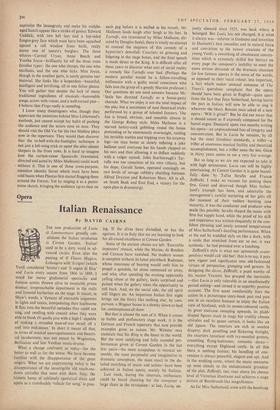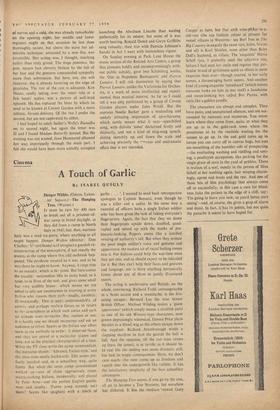Opera
Italian Renaissance
By DAVID CAIRNS
THE new production of Lucia di Lammermoor grandly con- olidates the Italian revolution at Covent Garden. 'Italian' used to be a dirty word in ad- vanced circles. Even after the passing of II Haut° Magico, Lohengrin with 11 cigno' (which Verdi considered 'brutto') and sogno di Elsa' and Lucia every season from 1866 to 1889, it stood for messy gladiatorial spectacles and famous scores thrown alive to insatiable prima donnas; irreproachable deportment in the stalls and licensed barbarism on the stage. It meant, in Shaw's words, a 'dynasty of execrable impostors in tights and tunics, interpolating their loathsome B flats into the beautiful melodies they could not sing, and swelling with conceit when they were able to finish Di quells pira with a high C capable of making a stranded man-of-war recoil off a reef into mid-ocean.' In short it meant all that, in terms of musical unscrupulousness and 'theatri- cal incoherence, was not meant by Wagnerian, Berliozian and late Verdian music-drama.
What a change confronts us today—for the better as well as for the worse. We have become familiar with the disappearance of the great singers. What we are experiencing today is the disappearance of the incorrigible old reach-me- down attitudes that went with them. Italy, the historic home of sublimely egotistical divas and opera as a ramshackle 'vehicle for song,' is pass- ing. If the divas have dwindled, so has the egotism. It is to Italy that we are learning to look for all-round excellence at Covent Garden.
Some of the ancient abuses are left. 'Execrable impostors' remain, while the Manias, de Reszkes and Carusos have vanished. No modern season is complete without its latest pinchbeck Radames, whose meanness of bearing would unfit him to propel a gondola, let alone command an army, and who, after spending the evening apparently yelling abuse at the gallery, looks surprised and pained when the gallery takes the opportunity to yell back. And, on the social side, the old spirit still lingers on. An important Italian first night brings out the finery like nothing else; by com- parison, a Wagner house is a dowdy down-at-heel lot, contemptuous of show.
But that is almost the sum of it. When it comes to feeble and perfunctory stage work, it is the German and French repertory that now provide examples gross as nature. ' Mr. Webster may maintain that his Ring is the finest in the world. But the most satisfying and fully rounded per- formances given at Covent Garden in the last few years—the most scrupulous in musical en- semble, the most purposeful and imaginative in dramatic conception, the most exact in the de- tailed matching of music and action—have been achieved in Italian opera, mainly by Italians.
Last week, during the intervals, enthusiasts could be heard claiming for the composer a large share in the revolution : at last, Lucia, un- justly silenced since 1925, was back where it belonged. But Lucia has not changed; it is what it always was—inferior in freshness and invention to Donizetti's best comedies and in natural force and conviction to the rawest creations of the young Verdi; a reworking of obsolescent conven- tions which is extremely skilful but betrays on every page the composer's inability to meet the more serious demands of the dramatic situation (in few famous operas is the sense of the words, as opposed to their vocal colour, less important, a fact which makes unusual nonsense of The Times's querulous complaint that the opera should have been giiien in English—quite apart from the fact that Joan Sutherland, having learnt the part in Italian, will now be able to sing it wherever she likes). Rossini once asked of a new opera : 'Will it grind?' But he did not mean that it should sound as if expressly composed for the barrel organ. Donizetti spent two months writing his opera—an unprecedented feat of integrity and concentration. But in Lucia he remains, by all but the most frivolous standards, a trifler—a trifler of enormous musical facility and theatrical accomplishment, but a trifler none the less. Once in thirty years seems to me a very fair average.
But so long as we are not expected to take it with high seriousness, Lucia can still be highly entertaining. At Covent Garden it is quite beauti- fully done by Tullio Serafin and Franco Zeffirelli. I make no excuses for putting them first. Great and deserved though Miss Suther- land's triumph has been, and admirable the management's careful nurturing of her gifts till the moment of their sudden bursting into maturity, it was the conductor and producer who made this possible. Serafin shaped the music with firm but supple hand, while the proof of his skill and experience was written eloquently in the con- fident phrasing and newly aroused temperament of Miss Sutherland's dazzling performance. When at the end he waddled slyly on like a duck, with a smile that stretched from ear to ear, it was symbolic : he had presided over a hatching.
Zeffirelli's style is what our spinsterish avant- gardistes would call 'old hat'; that is to say, it puts new vigour and significance into old-fashioned virtues of perspective, grouping and gesture. In designing the decor, Zeffirelli, a pupil worthy of his master Visconti, has grasped the inevitable —that Lucia is only tolerable in an unashamedly period setting—and turned it to superbly positive account. The first scene comfortably fixes the action in a picturesque story-book past and puts one in an excellent humour to enjoy the Italian view of Scotland; with its mouse-coloured castle, its great staircase sweeping upwards, its plaid- draped figures stuck in stagy but craftily chosen attitudes and its gauze curtain, it looks like an old jigsaw. The interiors are rich in sombre drapery, dark panelling and flickering firelight, the exteriors luxuriant with ivy-mantled grottos, crumbling flying-buttresses, romantic decay— everything except Highland cattle. In all this there is nothing fustian; his handling of con- vention is always powerful, elegant and apt. And in the wedding scene, where the music measures up most closely to the melodramatic grandeur of the plot, Zeffirelli, too, rises above his chosen level of Victorian' illustrator and achieves a stage picture of Rembrandt-like magnificence.
As for Miss Sutherland, even with the handicap of nerves and a cold, she was already remarkable on the' opening night; her middle and lower registers might on that occasion be less than thoroughly secure, but above the stave her ad- mirable technique, animated by a new fire, was irresistible. Her acting was. I thought, touching rather than truly grand. The stage presence, the pale, square face cleverly broken by the fall of her hair and the gestures commanded sympathy more than submission. But here, too, she will improve; she is already hovering on the edge of greatness. The rest of the cast is adequate. Ken Neate, coolly taking over the tenor role at a few hours' notice, was a picture of well-bred aplomb. He has replaced the bleat by which he used to be known at Covent Garden with a more athletic, hirsute delivery. Of the two I prefer the second, but am not captivated by either.
I had hoped to catch Sadler's Wells's Russalka on its second night, but again the tenor was ill and I found Madam Butterfly instead. But the evening was not wasted. Joan Hammond elbowed her way imperiously through the main part. I felt she would have been more suitably occupied launching the Abraham Lincoln than waiting pathetically for its return; but some of it was worth hearing. Ronald Dowd and Gwyn Griffiths sang robustly; their trio with Patricia Johnson's Suzuki in Act 3 went with tremendous vigour.
On Sunday evening at Park Lane House the music section of the Related Arts Centre, a group that pioneers boldly and uncompromisingly with- out public subsidy, gave two Schonberg works, the 'Ode to Napoleon Buonaparte' and Pierrot Lunaire. I will risk damnation by saying that Pierrot Lunaire, unlike the Variations for Orches- tra, is a work of more intellectual and experi- mental than musical interest. As far as I could tell it was ably performed by a group of Covent Garden players under John Woolf. But the soprano Noelle Barker gave a misleading and unduly irritating impression of sprechgesang, which surely means what it says—speechified song, with definite 'notes' declaimed firmly and distinctly, and not a kind of sing-song speech, sliding sketchily up and down the scale and achieving precisely the t^nuous and undramatic effect that is not intended.



































 Previous page
Previous page